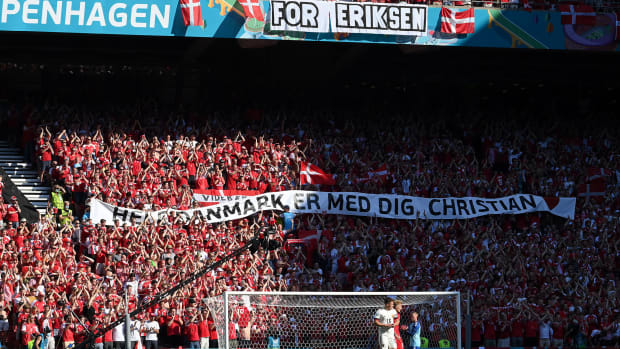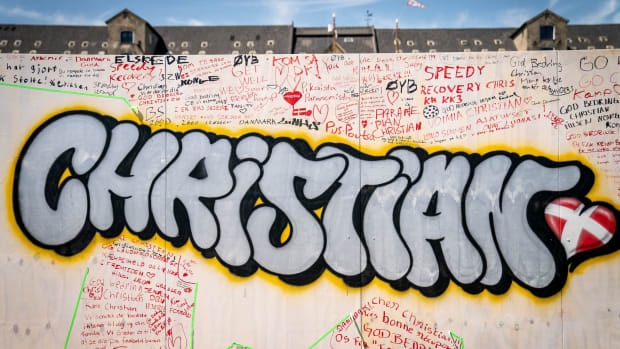Denmark came out inspired and supremely motivated as its star recovers from cardiac arrest, but Belgium's difference-making talent proved to be too much.
There were always two stories going on during Denmark’s match against Belgium on Thursday at Euro 2020. There was the football narrative, of Belgium’s creaking defense and a bench that featured three recovering stars. And there was the other, more prominent narrative: that of Christian Eriksen, the cardiac arrest he suffered during Denmark’s opening defeat to Finland and the celebration of his survival.
Further details of how he was saved had emerged earlier in the day in German newspaper Bild. German doctor and UEFA senior medical officer Jens Kleinfeld was by chance in the stands, having conducted a course in emergency first aid with the sideline medical team. When he saw how serious the situation was, he came onto the pitch. “Then I took control. We gave him electric shocks and continued with the heart massage,” he said. “When you start a resuscitation you need to do it as quickly as possible. But the team doctors are mainly treating many other injuries, which is why it’s more difficult for them to immediately recognize sudden cardiac death. That was clear to me when I saw them trying to pull his tongue out of his throat. That’s not how you save a life. A minimal overflexion of the head is completely sufficient.”
A defibrillator was used within two or three minutes of Eriksen's losing consciousness, which gave him a high chance of recovery. “He opened his eyes and spoke to me,” Kleinfeld went on. “I asked him, in English, ‘Are you back again?’ He said, ‘Yes, I am here.’ And then he added, ‘Oh, s---, I’ve only just turned 29 years old.’ ”

Eriksen remains in a stable condition at the Rigshospitalet, less than a five-minute drive from the stadium. He will be fitted with an ICD—an implantable cardioverter defibrillator—which sends electrical impulses to regulate heart rhythm.
The events of Saturday, though, clearly remain on everybody’s mind. "It has been some very special days, where football has not been the most important thing," said Denmark captain Simon Kjaer. "A shock, that will be part of me—part of all of us—forever. The only thing that is important and really matters, is that Christian is O.K. We will enter the pitch against Belgium with Christian in our hearts and thoughts. It gives us peace in our minds, which allows us to focus on the game of football. We will play for Christian, and as always for all of Denmark. This is the greatest motivation for us all."
That motivation was evident on the day. Before the opening kick, a huge Eriksen No. 10 Denmark shirt was unveiled on the pitch. Across the park, in the hospital, Eriksen reportedly wore his national shirt while watching on television. The players walked out after a spirited fan rendition of "You’ll Never Walk Alone," while the emotion was clear in the singing of the national anthem.

While it seems impossibly trivial in the broader context, the loss of Eriksen as an active member of the team has cost Denmark a lot of its creativity. Denmark coach Kasper Hjulmand, who spoke on Saturday with such eloquence about the need for his players to “dare” to be aggressive and play with the usual emotions against Finland, changed the shape to 3-4-3, with Pierre-Emile Højbjerg and Thomas Delaney's covering in front of the defensive line with Mikkel Damsgaard's coming into the forward line.
If there was any thought this might be as tentative as the second part of Saturday’s game against Finland, particularly given the scheduling of celebratory applause for Eriksen’s recovery after 10 minutes, it disappeared within seconds with a brusque challenge by Daniel Wass on Thorgan Hazard. Within two minutes, Denmark was ahead, with Belgium defender Jason Denayer's giving possession away and then being drawn out of position as Højbjerg, who missed a penalty on Saturday, played in Yussuf Poulsen to score the second-fastest goal in the history of the European Championship.
Toby Alderweireld at 32 and Jan Vertonghen at 34—and after suffering an ankle injury—suddenly looked their age against Damsgaard's darting runs. Denmark could easily have been ahead by more than one by halftime, riding the emotion of recent events in Copenhagen and the catharsis that came with taking to the field Thursday. But then on came Kevin De Bruyne as a halftime substitute for his first game since fracturing his cheek and eye socket in the Champions League final, and the game changed entirely.

De Bruyne and Romelu Lukaku link together majestically, and it was their combination that teed up the equalizer for Hazard. On then came Axel Witsel and Eden Hazard, two other players who have been regaining fitness after injuries, as Belgium looks to build toward full strength as the competition goes on. Another Lukaku run initiated the move that eventually led to De Bruyne's striking home a sublime winner.
Belgium’s defense remained unconvincing and Denmark had chances to level, but in the end the story of Belgium’s attacking quality came out on top. Roberto Martínez’s side has qualified for the last 16, while Denmark must beat Russia and hope for the best elsewhere if it is to do so as well. The Danes had hopes of far more than that entering the competition, but the Eriksen situation has put everything into context.
More Euro 2020 Coverage: